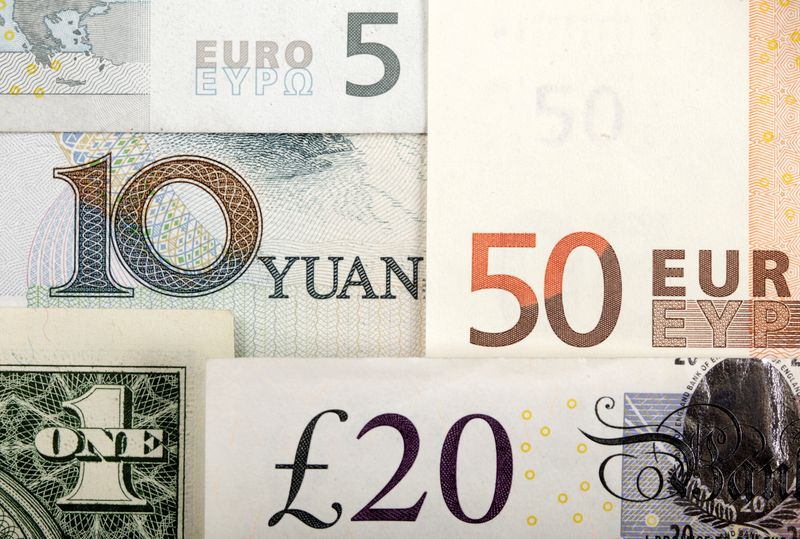By Laura Matthews
NEW YORK (Reuters) - Expectations for lower returns in stocks and bonds are sending some pension funds into currency markets to diversify their portfolios and bolster performance.
While both equities and fixed income have partially rebounded from last year's steep declines, some portfolio managers worry the scope for upside in either asset class may be limited, as markets face a tangle of issues including a standoff over raising the U.S. debt ceiling and a potential recession brought on by the Federal Reserve's aggressive monetary policy tightening.
As a result, investors are looking at currency strategies to boost their portfolio's overall returns. Currency managers said they are seeing more inquiries from government and corporate pensions in recent months.
"Most pension funds, including us, have been trying to add differentiated sources of returns," said Sriram Lakshminarayanan, chief investment officer of the Iowa Public Employees' Retirement System, which oversees roughly $40 billion.
The fund, which already has roughly $400 million invested in strategies that trade currencies, is in the process of adding a forex strategy that invests in emerging market currencies to its portfolio, Lakshminarayanan said.
RIDING VOLATILITY
Global central banks cut rates in the aftermath of the 2008 financial crisis and generally kept them low, ironing out monetary policy divergences and suppressing the market swings that help traders make money in forex.
But currency volatility shot higher last year, as central banks across the world began raising rates to fight surging inflation, fueling sharp moves in the U.S. dollar, British pound and a wide range of other currencies.
While gyrations have been more muted in 2023, some investors believe volatility will keep bubbling up, driven in part by central banks normalizing monetary policy at differing pace.
"When interest rates were compressed … those are times when these strategies may not perform quite as great. But what we're seeing in this particular market is perfect for these types of strategies," said Joe Hoffman, CEO of Chicago-based Mesirow Currency Management.
The firm is fielding "considerably more" inquiries than it did two years ago as investors look for alternative sources of return, he added.
SEARCHING FOR RETURNS
Investors' hunt for assets that can produce returns if stocks and bonds both tumble, as they did in 2022, is also driving interest in foreign exchange strategies. Searches for managers of dynamic currency overlay strategies, which investors use to generate additional returns as well as hedge risk, have more than doubled in the last 12 months versus the prior five-year rolling average, said Toby Goodworth, managing director and head of liquid markets at bfinance, a consultancy that helps pension funds with investment strategy, including manager selection.
One reason is that currency strategies have tended to produce returns that are negatively correlated to the S&P 500.
The Barclay Hedge Currency Traders Index, for example, has a correlation of -0.157 correlation versus the S&P 500 Total Return Index over the last 24 years. A correlation of 1 would indicate that assets move in the same direction, while a -1 correlation shows that assets move in opposite directions.
The index returned 8.9% in 2022, Backstop-BarclayHedge data show. The S&P 500 fell 19.4% that year while the ICE (NYSE:ICE) BofA US Treasury Index slid 13%, its biggest annual loss in history.
After last year's twin declines in stocks and bonds, "any additional source of diversification is even more valuable," said Van Luu, global head of solutions strategy, fixed income and FX, at Russell Investments in London.
Some currency managers believe funds' allocations to foreign exchange are often too small to make a meaningful difference. Allocations to currencies typically make up less than 1% of funds' portfolios, said Ulf Lindahl, CEO at Currency Research Associates.
"Regardless of what the return is, it has no impact on the portfolio," Lindahl said.
Meanwhile, the time it takes funds to hire a currency manager often stretches for more than a year. That could mean currency markets may have gone dormant once again by the time a decision is made, Lindahl said.
Others, however, believe uncertainty in debt and equity markets is likely to continue stoking interest in forex from global pension funds.

Dominik Mueller, head of currency management at German bank Metzler said the lender, in cooperation with its Japanese subsidiary, won an active currency overlay mandate from a large pension fund in Japan in 2022.
Increasing differentials between interest rates are a "favorable scenario or environment for active currency strategies," he said.